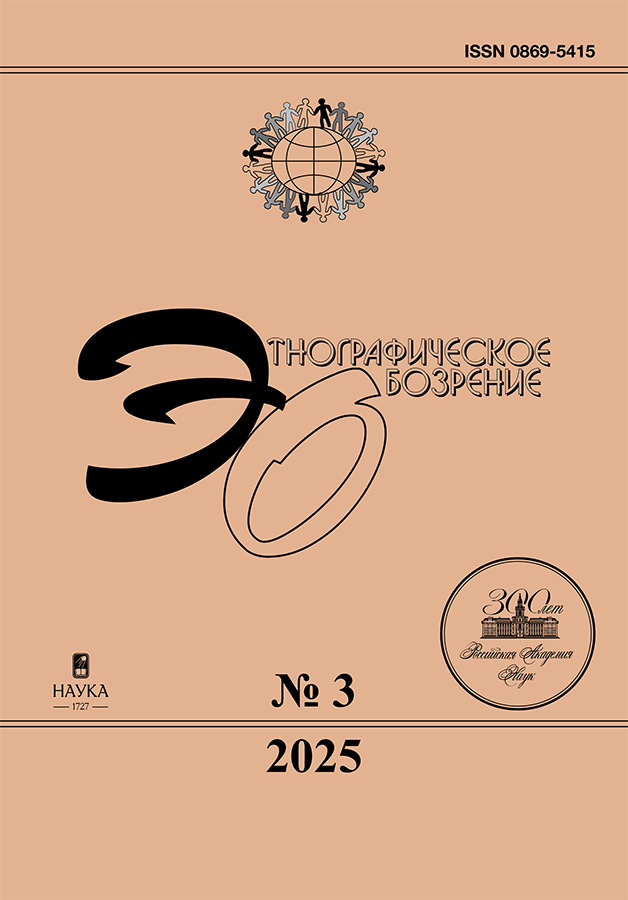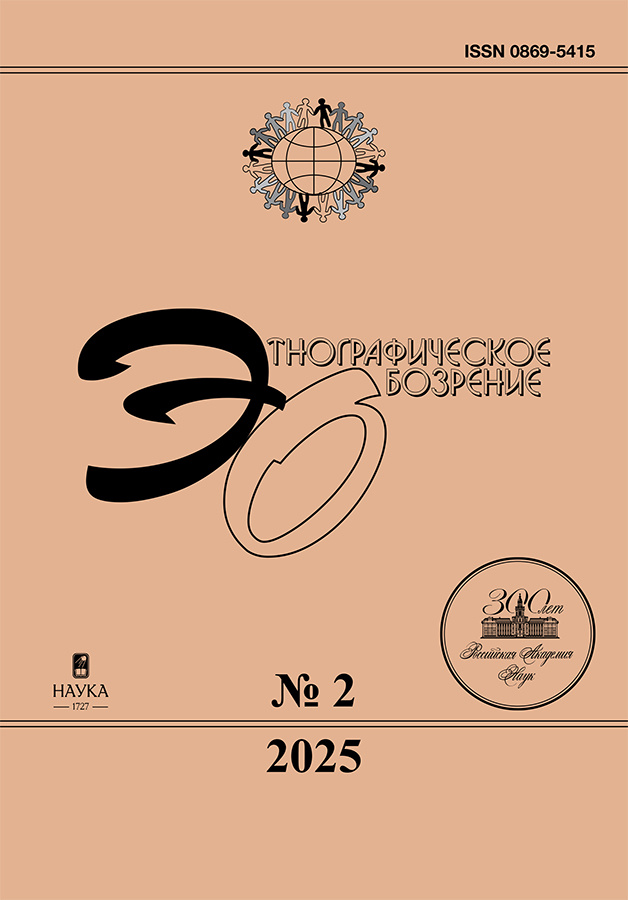Temporalities and Chronopolitics of Municipal Governance
- Authors: Zakharova A.1
-
Affiliations:
- European University at St. Petersburg
- Issue: No 2 (2025)
- Pages: 160–180
- Section: Research Articles
- URL: https://bulletin.ssaa.ru/0869-5415/article/view/686654
- DOI: https://doi.org/10.31857/S0869541525020092
- EDN: https://elibrary.ru/TKFGJG
- ID: 686654
Cite item
Abstract
The article is focused on the temporality of two rural administration employees in southwestern Siberia: the structural grounds of two local officials’ temporal practices (“hastening” and “waiting out”) in their connection with perceived uncertainty are under analysis. The author claims that amid the Russian centralized municipal governance system in the 2020s the rural bureaucrats find themselves in a position of double dependence. Their temporality is being oppressed by the superior governors’ temporality through the chronopolitics of urgent requirements and being interdependent through the chronopolitics of care / non-attention with the rural settlers’ temporality. In these conditions rural bureaucrats acquire the shared practical sense of time, making them permanently anticipate the future in the present. Meanwhile, the very explicit reference on inability to plan their time, often made by rural officials, is not only a bureaucratic tool to evade the local residents’ request legitimately, but supposedly it also lets rural officials unmask the corporative metaphor of “teamwork” and restore the real boundaries between “superiors” and “subordinates” during their conversations with colleagues, along with it enabling rural bureaucrats to perceive themselves as wise administrators.
Full Text
About the authors
Aleksandra Zakharova
European University at St. Petersburg
Author for correspondence.
Email: azakharova@eu.spb.ru
ORCID iD: 0009-0005-4740-2845
аспирант, исследователь
Russian Federation, 6/1a Gagarinskaya Str., St. Petersburg, 191187References
- Agapov, M.G., et al. 2021. Razmyshleniia ob “antropologii vremeni” i rezhimakh temporal’nosti: repliki k diskussii [Reflections on the “Anthropology of Time” and Regimes of Temporalities: Discussion Forum]. Etnograficheskoe obozrenie 6: 102–126. https://doi.org/10.31857/S086954150017937-0
- Andersen, D., and T.T. Bengtsson. 2019. Timely Care: Rhythms of Bureaucracy and Everyday Life in Cases Involving Youths with Complex Needs. Time & Society 28 (4): 1509–1531. https://doi.org/10.1177/0961463X18783371
- Bakhtin, M. 1975. Formy vremeni i hronotopa v romane: ocherki po istoricheskoi poetike [Forms of Time and Chronotope in the Novel: Essays on Historical Poetics]. In Voprosy literatury i estetiki [Questions of Literature and Poetics], by M. Bakhtin, 234–407. Moscow: Khudozhestvennaia literatura.
- Bear, L. 2016. Time as Technique. Annual Review of Anthropology 45: 487–502. https://doi.org/10.1146/annurev-anthro-102313-030159
- Bourdieu, P. 1993. Sotsiologiia politiki [Sociology of Politics]. Moscow: Socio-Logos.
- Bourdieu, P. 2001. Ot korolevskogo doma k gosudarstvennomu interesu: model’ proiskhozhdeniia biurokraticheskogo polia [From the King’s House to the Reason of State: A Model of the Genesis of the Bureaucratic Field]. In Sotsioanaliz P’era Burd’e [Socioanalysis of Pierre Bourdieu], 141–178. Moscow; St. Petersburg: Institut eksperimental’noi sotsiologii; Aleteiia.
- Bourdieu, P. 2001. Prakticheskii smysl [Practical Reason]. St. Petersburg: Aleteiia.
- Cooper, E., and D. Pratten. 2015. Ethnographies of Uncertainty in Africa: An Introduction. In Ethnographies of Uncertainty in Africa, edited by E. Cooper and D. Pratten, 1–16. New York: Palgrave Macmillan.
- Fadeeva, O.P. 2022. Transformation of the Rural Self-Government: A Siberian Case. The Russian Peasant Studies 7 (2): 122–157. https://doi.org/10.22394/2500-1809-2022-7-2-122-157
- Geoffrion, K., and V. Cretton. 2021. Bureaucratic Routes to Migration: Migrants’ Lived Experience of Paperwork, Clerks and Other Immigration Intermediaries. Anthropologica 63 (1): 1–28. https://doi.org/10.18357/anthropologica6312021184
- Graeber, D. 2011. Revolution in Reverse. In Revolutions in Reverse: Essays on Politics, Violence, Art, and Imagination, by D. Graeber, 41–66. New York: Autonomedia.
- Graeber, D. 2016. Utopiia pravil: o tekhnologiiakh, gluposti i tainom obaianii biurokratii [The Utopia of Rules: On Technology, Stupidity, and the Secret Joys of Bureaucracy]. Moscow: Ad Marginem Press.
- Griffiths, M. 2013. Living with Uncertainty: Indefinite Immigration Detention. Journal of Legal Anthropology 1 (3): 263–286. https://doi.org/10.3167/jla.2013.010301
- Gudova, E.A. 2020. “A Letter Should Be Long-Awaited”: The Temporal Synchronization of Russian Post Office Employees. Sociology of Power 32 (1): 155–178. https://doi.org/10.22394/2074-0492-2020-1-155-178
- Janeja, M.K., and A. Bandak, eds. 2018. Ethnographies of Waiting: Doubt, Hope and Uncertainty. London: Bloomsbury Publishing.
- Karaseva, A.I., and M.P. Momzikova. 2019. Chasovye poiasa i sinkhronnye telekommunikatsii: nezametnaia rabota po temporal’noi koordinatsii u gorozhan Dal’nego Vostoka Rossii [Time Zones and Synchronous Telecommunications: The Hidden Work on Temporal Coordination among Citizens of the Far East of Russia]. Etnograficheskoe obozrenie 3: 42–61. https://doi.org/10.31857/S086954150005295-4
- Lipsky, M. 1969. Toward a Theory of Street-Level Bureaucracy. Madison: Institute for Research on Poverty, University of Wisconsin.
- Lipsky, M. 2010. Street-Level Bureaucracy: Dilemmas of the Individual in Public Services. New York: Russell Sage Foundation.
- Mathur, N. 2015. Paper Tiger: Law, Bureaucracy and the Developmental State in Himalayan India. Cambridge: Cambridge University Press.
- May, J., and N. Thrift, eds. 2003. Timespace: Geographies of Temporality. London: Routledge.
- Murphy, M., and P. Skillen. 2015. The Politics of Time on the Frontline: Street Level Bureaucracy, Professional Judgment, and Public Accountability. International Journal of Public Administration 38 (9): 632–641. https://doi.org/10.1080/01900692.2014.952823
- Ssorin-Chaikov, N. 2006. On Heterochrony: Birthday Gifts to Stalin, 1949. Journal of the Royal Anthropological Institute 12: 355–375. https://doi.org/10.1111/j.1467-9655.2006.00295.x
- Ssorin-Chaikov, N. 2017. Two Lenins: A Brief Anthropology of Time. Chicago: HAU Books.
- Ssorin-Chaikov, N.V. 2021. Antropologiia vremeni: ocherk istorii i sovremennosti [The Anthropology of Time: History and the State of the Art]. Etnograficheskoe obozrenie 6: 83–103. https://doi.org/10.31857/S086954150017934-7
- Tahara, F. 2013. Principal, Agent or Bystander? Governance and Leadership in Chinese and Russian Villages. Europe-Asia Studies 65 (1): 75–101. https://doi.org/10.1080/09668136.2012.717367
- Thompson, E.P. 1967. Time, Work-Discipline, and Industrial Capitalism. Past & Present 38: 56–97. https://doi.org/10.1002/9781119395485.ch3
- Weber, М. 2019. Khoziaistvo i obshchestvo: ocherki ponimaiushchei sotsiologii: V 4 t. [Economy and Society: An Outline of Interpretive Sociology, 4 vols]. Vol. 4, Gospodstvo [Authority]. Moscow: Vysshaia Shkola Ekonomiki.
- White, S. 1998. Time, Temporality and Child Welfare: Notes on the Materiality and Malleability of Time(s). Time & Society 7 (1): 55–74. https://doi.org/10.1177/0961463X98007001003
- Whyte, S.R. 2009. Epilogue. In Dealing with Uncertainty in Contemporary African Lives, edited by L. Haram and C.B. Yamba, 213–216. Uppsala: Nordiska Afrikainstitutet.
- Zakharova, A. 2023. Moral’naia kartografiia: klassifikatsii zhitelei dereven v rabochei povsednevnosti selskikh biurokratov [Moral Cartography: Classifications of Village Residents in the Everyday Life of Rural Bureaucrats]. Antropologicheskii forum 59: 103–129. https://doi.org/10.31250/1815-8870-2023-19-59-103-129
- Zerubavel, E. 1979. Patterns of Time in Hospital Life: A Sociological Perspective. Chicago: University of Chicago.
Supplementary files











